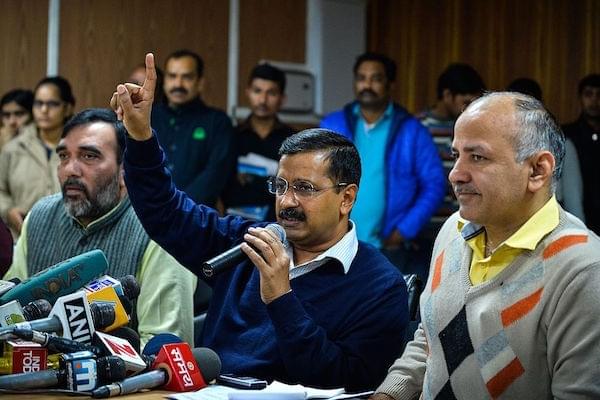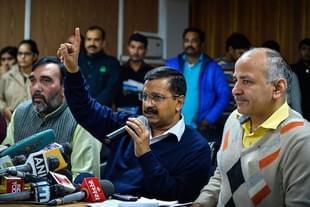Politics
The Government That Delhi Deserves Might Not Be The One It Needs
Ranjeet Rane
Aug 05, 2016, 04:30 PM | Updated 04:30 PM IST
Save & read from anywhere!
Bookmark stories for easy access on any device or the Swarajya app.


In February last year, Delhi voters gave the Aam Aadmi Party (AAP) a massive mandate in the 2015 Assembly Elections. While the collective impatience of Delhi’s electorate may have catalysed this result, AAP’s tactful transformation from a single-issue (corruption) party, coupled with a lack of fresh campaign ideas from the Bharatiya Janata Party (BJP) ensured a landslide victory for AAP. But the recent High court verdict reiterating that the Lieutenant Governor (LG), appointed by the central government, is the administrative head of Delhi makes one wonder if the mandate was worth it.
In 2015 the new government was expected to bring about the long-awaited “change” in the administration of the city . What Delhi got instead was a Chief Minister (CM) who seemed disinterested in governance. The city also got dragged into the turf war between the CM and the LG over who would have the last say in all matters pertaining to the Delhi Government. What began as an exchange of unsigned files quickly turned into a mud-slinging feast on social media and was followed up by filing of court cases to determine the authority wielded by each of the two positions. Any keen observer would know that the LG, owing to his constitutional mandate, had an upper hand in this turf war. The Delhi High Court has, to use the cliché, shown the book to the AAP government, the book being the Constitution of India.
According to our Constitution, the tasks of legislation, administration and maintenance of law and order are to be performed by the central government for all Union Territories. The Delhi government can theoretically make laws on 60 subjects in the state list and 45 in the concurrent list, like any other state government; however, in practice, even matters of municipal relevance need approvals from the central government. So while the Ministry of Home Affairs at the Centre dictates terms to the Delhi Police, other ministries oversee functioning of other organisations like the Delhi Municipal Corporation and the Delhi Development Authority.
In fact, section 239 AA 3(c) of the Indian Constitution states that if any provision of law made by the Legislative Assembly is repugnant to any provision of law made by Parliament, the law made by it shall prevail. Effectively, nothing prevents Parliament from enacting a law amending or repealing a law passed by the Delhi Assembly.
Further, close to 75 percent of the budgetary support for the Delhi Government is allocated by the central government. Without this support, the city of Delhi has very few revenue-generation avenues, and it is not endowed with natural resources to monetise like coal or natural gas. With such high levels of monetary dependency, any government in Delhi will need to toe the line of the central government to implement any sort of structural reforms. It is due to this dependence that most of the work done by municipal corporations in other metropolitan cities is seen delegated to the state government.
As of now the primary argument is that having a Legislative Assembly allows for better representation of the potpourri of residents in Delhi from the length and breadth of India. Going by that logic, though, the city of Mumbai would also need a state government of its own. But as one can see, the Brihanmumbai Municipal Corporation and the Maharashtra state government are doing a fine job of keeping the financial capital on its toes despite its fair share of woes.
A second election in two years (entitling an expense of around Rs 100 crore on the exchequer) and the narratives that have shaped around it have undermined the strategic importance of Delhi as the seat of the central government. As the national capital and a city that houses the Parliament along with the Supreme Court , important defence establishments and monuments of national pride, like the India Gate, Delhi definitely needs a more directly accountable governance structure.
Conceding to the demands of granting ‘statehood’ to Delhi would amount to re-inventing the wheel of governance and bring to the table a new set of issues. What Delhi needs now is to look at readily available models like Washington DC, where an empowered mayor works along with a council under the direct guidance of the United States Congress that has the right to review and overturn (if necessary) laws passed by the Council.
An efficient municipal corporation under the direct oversight of the central government may work in Delhi’s favour. Such a model would help re-enforce the strategic importance of the city. It would not be in our national interests to allow our capital city to become a laboratory for political experiments. The Delhi CM has already gone on record stating that they would appeal against the Delhi High Court verdict in the Supreme Court. It is expected that the Supreme Court would intervene in the present state of affairs to make sure that a more accountable and credible structure is made available to the people of Delhi at the earliest.




